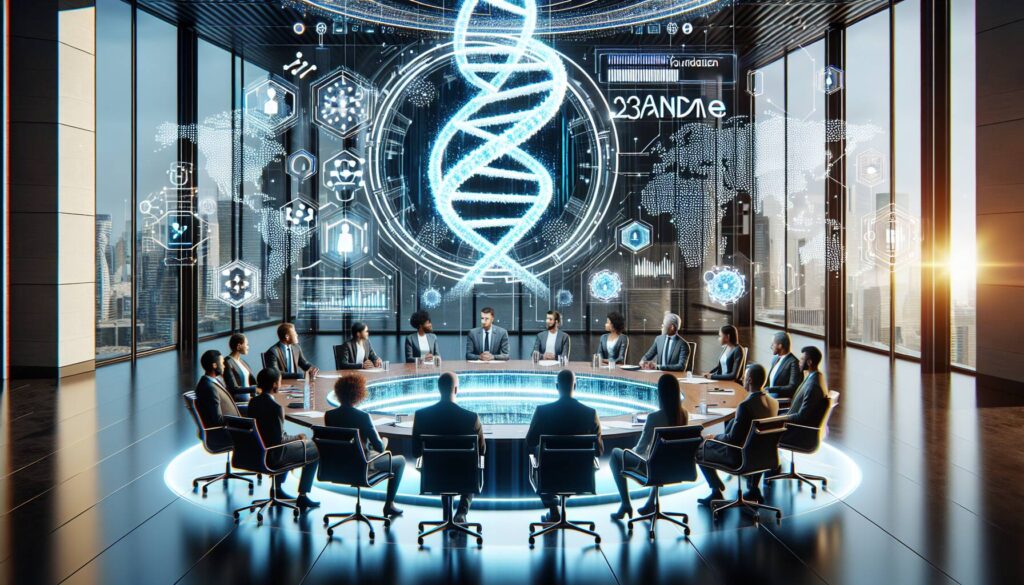The cryptocurrency landscape is buzzing with speculation following the Sei Foundation’s bold proposition to acquire the once-iconic genetic data firm, 23andMe, which has recently filed for bankruptcy. While many experts view this potential move as a long shot—possibly even a publicity stunt—the implications of such a transaction could ignite a major shift in the tech world.
If successful, this deal would represent a groundbreaking moment, where a Web3 organization intervenes to revive a struggling Web2 enterprise, fostering discussions about the future dynamics of technology. In a space increasingly dominated by Artificial Intelligence, smaller, agile firms are challenging established tech giants, changing the way we think about innovation and competition.
“A purchase of this magnitude could redefine our understanding of data privacy and security at a time when awareness of how our information is used by major corporations is growing,”
highlighting the potential importance of decentralized technologies in protecting sensitive personal information. 23andMe retains critical data from over 15 million individuals, making it a unique case for discussions around data ownership and privacy. The prospect of this data falling into the hands of health and life insurance companies raises alarms about the misuse of personal information, potentially leading to discrimination based on genetic predispositions.
As trust in centralized entities continues to diminish, a successful acquisition could catalyze a broader awakening about the need for individuals to own their own data. This moment may propel more people toward decentralized solutions, such as those offered by Sei and other emerging blockchain technologies. Currently celebrated for their promised security, these technologies present a compelling alternative to the vulnerabilities inherent in centralized data management.
“This is a watershed moment for people to understand the importance of data self-sovereignty,”
as the conversation shifts away from reliance on traditional companies. With the possibilities presented by blockchain, including permanent storage solutions like Arweave, there’s a call to action for individuals to safeguard their most private information. In this context, the potential 23andMe sale serves not only as a significant business maneuver but also as a pivotal moment that could reshape perceptions of Web3 technologies and their applications in our everyday lives.

The Potential Impact of a Sei Foundation and 23andMe Deal
The proposed acquisition of 23andMe by the Sei Foundation could have significant implications for data privacy, security, and the evolving landscape of technology from Web2 to Web3. Here are the key points to consider:
- Web3 Rescuing Web2:
- A potential scenario where a blockchain organization saves a traditional tech company could symbolize a major shift in technology paradigms.
- This may change public perception and utilization of Web3 technologies, emphasizing the importance of decentralization.
- Public Awareness of Data Privacy:
- The sale could highlight the vulnerabilities of personal data, especially sensitive information such as DNA.
- Increased public understanding of how centralized entities manage and monetize personal data may lead to a demand for greater transparency and security.
- Risks of Data Misuse:
- If the acquisition fails, the DNA data might be sold to insurance companies, potentially leading to discrimination in healthcare.
- This scenario underscores the need for regulatory measures to safeguard personal data.
- Data Self-Sovereignty:
- The potential transaction could spark a broader conversation about the importance of individuals owning and controlling their own data.
- Decentralized technologies might provide solutions for personal data security, contrasting traditional models.
- Technological Solutions:
- Emerging technologies like Sei and Arweave offer secure data storage options that may empower users to manage their data safely.
- This trend may shift market dynamics, leading consumers to seek out platforms that prioritize data privacy.
- Trust in Centralized Organizations:
- The breakdown of trust in traditional tech companies highlights an urgent need for decentralized alternatives.
- A successful merger could help reshape public sentiment towards both Web2 and Web3 technologies.
The 23andMe sale could symbolize a turning point in data privacy awareness and the future of technology adoption.
Sei Foundation’s Bid for 23andMe: A Web3 Revolution or a Publicity Stunt?
The recent news about the Sei Foundation’s intention to acquire the bankrupt genetic data company 23andMe has ignited conversations about the future of data privacy and blockchain technology. This proposed acquisition raises intriguing possibilities, especially considering that it would symbolize a significant move from a Web3 entity taking over a Web2 giant. Many experts see this as a potential paradigm shift in the tech ecosystem, where a smaller, agile blockchain company challenges the dominance of established tech behemoths.
Competitive Advantages: One of the most notable advantages of this move is the opportunity it presents for increased public awareness around data privacy. Unlike the conventional tech giants who have often been scrutinized for their data handling practices, a blockchain-based custodian of sensitive DNA information could foster a new era of transparency and security. This shift could be particularly beneficial for consumers, who are becoming increasingly wary of how their data is stored and used. By positioning itself as a champion of data sovereignty, Sei might attract a demographic eager for digital privacy solutions, promoting the use of decentralized technologies that offer greater control and security for personal information.
Potential Disadvantages: However, skepticism abounds regarding the feasibility of this transaction. Many see this as a long-shot and possibly a mere publicity stunt rather than a serious financial strategy. If the acquisition fails to materialize, Sei risks losing credibility in an already competitive blockchain landscape that is keenly aware of the significance of trust and reliability. Additionally, if 23andMe’s data eventually falls into the hands of healthcare or insurance companies, it could lead to ethical dilemmas, where discrimination based on genetic information becomes a grim reality. This could engender a backlash against both Sei and 23andMe, harming reputations and impacting consumer trust across both sectors.
As the narrative unfolds, it is essential to recognize the implications this acquisition could pose for various stakeholders. Consumers may benefit significantly from enhanced privacy measures; however, existing Web2 companies might feel threatened by this shift toward decentralization and the resulting awareness of consumer data control. This tension could pave the way for further innovations and regulations surrounding data ownership in the tech world.
The industry’s response is crucial. Should the proposed acquisition gain traction, major players in both the blockchain and traditional tech sectors will have to adapt quickly or risk being left behind in this evolving landscape. In short, the stakes are high, and as trust in centralized authorities wanes, we might witness a collective movement toward personal data autonomy like never before.

















